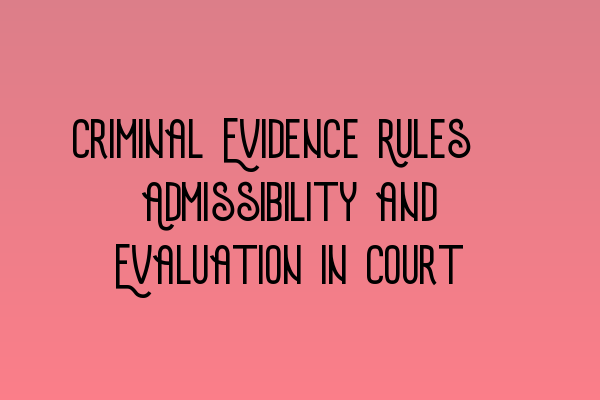Criminal Evidence Rules: Admissibility and Evaluation in Court
Welcome to the blog of SQE Criminal Law & Practice UK! In this article, we will explore the important topic of criminal evidence rules, specifically focusing on their admissibility and evaluation in court. Understanding these rules is crucial for a successful career in criminal law and passing the SQE 1 and SQE 2 exams. If you’re looking for SQE 1 practice exam questions or SQE 2 preparation courses, we have you covered with our SQE 1 Practice Exam Questions and SQE 2 Preparation Courses.
Admissibility of Evidence
In criminal proceedings, evidence plays a vital role in proving or disproving a case. However, not all evidence is admissible in court. The admissibility of evidence is governed by specific rules that ensure fairness and reliability in the criminal justice system.
One key rule is the exclusionary rule, which prohibits the use of evidence obtained through illegal searches and seizures. This rule protects the constitutional rights of individuals and ensures that evidence tainted by unlawful police conduct is not used against the accused. To understand this rule better, you can refer to our article on SQE 1 Practice Mocks FLK1 FLK2.
Additionally, the rules of admissibility require that the evidence is relevant to the case at hand. Evidence must directly relate to the facts in issue and have a tendency to prove or disprove those facts. Irrelevant evidence is excluded to avoid wasting the court’s time and to prevent confusion in the jury’s decision-making process.
Evaluation of Evidence
Once evidence is deemed admissible, it is subjected to evaluation by the court. The evaluation process involves assessing the credibility, reliability, and probative value of the evidence. This ensures that only reliable evidence is used to make informed decisions about guilt or innocence.
When evaluating witness testimony, the court considers factors such as the witness’s demeanor, consistency in their statements, and any inconsistencies or contradictions. This evaluation helps determine the trustworthiness of the witness and the weight their testimony should carry in the decision-making process.
Physical evidence, such as fingerprints or DNA samples, undergoes scientific evaluation. Expert witnesses are often called upon to testify about the procedures used to collect and analyze the evidence. Their testimony helps the court understand the scientific principles behind the evidence and its significance in the case.
To learn more about the evaluation of evidence in criminal proceedings, you can explore our comprehensive SQE 1 Preparation Courses, which cover this topic in detail.
Conclusion
Admissibility and evaluation of evidence are critical aspects of the criminal justice system. Understanding the rules governing these processes is essential for any aspiring criminal lawyer. By grasping the intricacies of admissibility and evaluation, you will be well-prepared for the SQE 1 and SQE 2 exams and have the necessary skills to excel in the field of criminal law.
If you’re looking for more information on SQE exam dates or need further guidance in your preparation, feel free to check out our article on SRA SQE Exam Dates.
Good luck with your studies and future career in criminal law!
